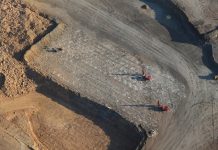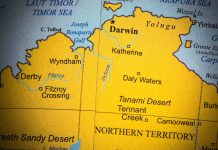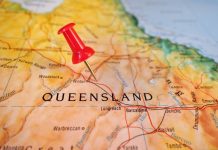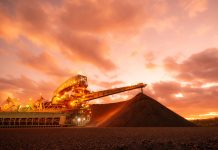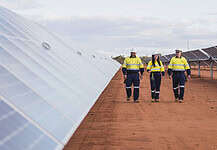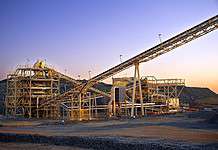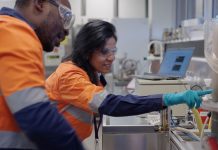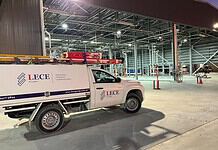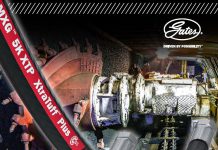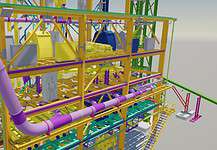CASTINGS Tasmania puts a high premium on the quality of its products, and its commitment to excellence is evident in the company’s attention to detail throughout the metals casting process and in its foundry services.
Indeed, foundry services are at the heart of Castings Tasmania’s business and the company has invested heavily in new technology such as 3-D scanners and modelling and graphics software to upgrade its processes.
High-technology production methods ensure the Launceston foundry’s steel products remain of superior quality in a competitive market.
Castings Tasmania general manager Chris Smart said product quality is an important consideration both for the company and its high-end customers.
“We make high quality castings that people are prepared to pay a premium for,” he said.
Castings Tasmania’s steel products make their way into many sectors of Australian industry from transportation to mining,
The company has manufactured parts for Australian public transport and has cast rigging gear for dragline excavators.
These steel castings are required to have a high tensile strength and durability.
Quality is maintained right through the metal casting process by the company’s technical experts, who carry out extensive metallurgical tests on its steel products during the whole manufacturing process.
Castings Tasmania technical manager Matthew Whittaker said the foundry undertakes a comprehensive range of tests on metal castings prior to and after metal pouring to guard against any potential defects.
“We do a wide range of testwork depending on the customers’ requirements,” he said.
“We perform in-house chemical testing with an optical emission spectrometer, in-house ultra-sonics, magnetic particle inspection and dye penetrant testing.”
Checks are undertaken both before and after metal is poured into moulds.
Production lines
The metals casting process in the foundry involves a series of intricate steps.
Every step has to be completed to a high standard to ensure the final steel product exactly meets clients’ specifications.
Starting with the creation of a pattern or model, through to metal pouring and on to finishing and polishing, the final product has to be flawless.
At the design stage, Castings Tasmania uses state-of-the-art technology.
This includes an Artec Leo 3-D scanner so that foundry staff can quickly build a digital representation of any casting in prototype form.
SOLIDCast software at the foundry simulate different metal pouring scenarios, so that staff and customers can visualise the end product in digital form.
On top of these software process improvements, the company maintains extensive quality checks from the beginning to the end of production.
Prior to its pouring, molten metal is analysed to ensure that the casting has the correct level of strength and grade as required by the customer.
The company operates two different production lines in its foundry workshop.
“We have two areas where we pour castings,” Mr Smart said.
There is a fast loop area, an automated production zone for mass-produced steel, and a jobbing floor which carries out one-off and larger castings.

High quality Tasmanian sand is used as the basis of moulds for metal castings and is tested to ensure it is strong enough to hold several tonnes of metal.
Another locally-sourced material used in the foundry is aluminium, which is used at a Tasmanian smelter and is used in the steel de-oxidisation process.
The foundry has the capacity to melt up to five tonnes of metal at a time, and its largest casting to date has been four and a half tonnes.
The annual melting capacity of the foundry is 3500 dressed mass tonnes.
The foundry will trial new castings to develop a prototype before going into full production.
“If it is a new casting, or if we have never made it before, we have a controls procedure whereby we will make one or two trial castings to make sure they are acceptable to the customer,” Mr Smart said.
“Then we will go into full production.”
Castings Tasmania’s new owner, Recycal Group, provides the majority of the foundry’s feedstock from its recycled scrap metal business.
Steel scrap is heated to a temperature of 1600 deg Celsius, before various alloys are added to produce steel with certain characteristics.
“We melt the scrap and then we add whatever we need to get a certain metal specification, such as nickel, high carbon chrome, etc,” Mr Smart said.
After the steel is melted to a molten liquid it is ready for pouring and is transferred to one of the two metal casting production areas in the foundry.
“The metal comes out of the furnace in a ladle and is moved on a trolley to either the fast loop or the jobbing area and is then poured into moulds,” Mr Smart said.
Once the metal is cast, it is left in its mould for up to 24 hours to allow the product to cool, and the next stage is the after-cast process.
“The casting goes through a shake-out process that takes most of the sand from the casting,” Mr Smart said.
“Then it goes through a shot blast to take the last of the sand off it.
A power hammer or oxy-cutting is used to remove the metal casting’s feeders that assist when pouring metal into a mould.
The product then goes through a heat treatment stove up to 1100 deg Celsius.
At the finishing stage, the metal casting is put through a quenching process using either air or water.
It is then subjected to welding and grinding, and is painted if required.
Further testing is carried out on metal products post-casting to ensure they meet customer specifications including such tests as magnetic particle checks.
Long history
Castings Tasmania has a long and illustrious history that stretches back to 1833, and the firm has played a role in many chapters of Australia’s history, including the two world wars.
This long tradition means the company has many experienced workers, some with decades of service, who can cast almost any type of ferrous metal product.
Fifty-five workers are employed at the foundry in its castings production.
The foundry is always on the lookout for new applications for its steel products and has had some customer interest from the aquaculture sector.
“We have had some interest from salmon farms in Tasmania for mooring rings that in effect are anchors for fish pens,” Mr Whittaker said.
“Historically they have used products from China or welded steel pipe together.
“Having one single piece cast in Tasmania from 99pc recycled materials has really impressed our customers in terms of its sustainability.”
Another alternative market for its metal products in the longer term could be the heavy vehicle market.
The company is also investigating expanding its line of stainless steel products.
Recycal Group, which took over Castings Tasmania in 2019, has invested heavily in new technology for the company including in 3-D modelling and scanners to increase the foundry’s production efficiency.
More information: Castings Tasmania
Phone: 03 9873 1133
Email: Chris Smart, general manager, [email protected]
Website: https://castingstas.com.au/

